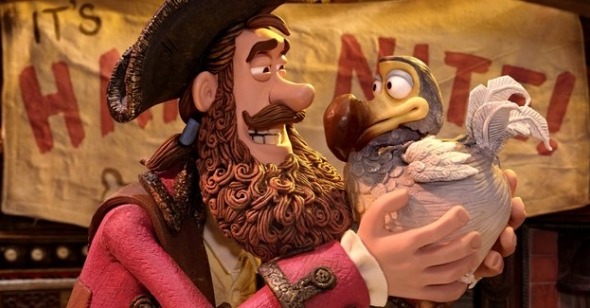Monday Hangover:
The Pirates! Band of Misfits
by Jeff Reichert and Farihah Zaman
The Pirates! Band of Misfits is a terrific concept (the dry Monty Python–esque wit and handmade charms of stop-motion animation masters Aardman applied to a swashbuckling high seas adventure) casting desperately about for a movie. Perhaps the sliver of a plot—in which the pirate captain known as Pirate Captain and his motley mates angle for the Pirate of the Year Cup, despite all evidence suggesting that they’re among the less successful brigand concerns going—is an intentional jab at that other pirate film franchise, which spun itself from a theme park ride into a bloated, narratively soggy four-picture behemoth. Yet, though the animation is typically wowing, I found myself more astonished at how rudderless the whole enterprise seemed. When it becomes clear that the story will hinge on the discovery and eventual fate of the last living dodo bird (who’d been camouflaged up until that point as Pirate Captain’s oddly shaped parrot), I couldn’t help but feel a little deflated.
The introduction of Charles Darwin as a horny, monkey-visaged scientist looking into evolution to score chicks isn’t taken nearly far enough (though, given how little traction his central theories seem to be making in the world at large these days, perhaps Aardman shouldn’t have troubled his grave). Meanwhile, Imelda Staunton, as the villainous pirate-hating Queen Victoria, is only afforded the opportunity to strike a single hysterical note, unlike in the Harry Potter universe, where Staunton skillfully deployed a spectrum of calculated cruelties with a winning smile. Aardman’s detail work makes the marginalia of their films sing with sly running jokes, and Pirates is no exception, but it feels here, for the first time in one of their major films, that they’ve slipped a little on the fundamentals.
Given that the gestation periods for animated films are variable and easily outpace those for baby elephants, it is likely mere happenstance that Pirates comes so close on the heels of 2011’s Arthur Christmas. Even so, for a studio whose feature-length output has been pleasurably rare, the appearance of two films in five months, both of which, though, not without certain charms, don’t scale nearly to the heights of Chicken Run or Wallace and Gromit: The Curse of the Were-Rabbit, raises fears about overextension, and with it, the cheapening of the Aardman imprimatur. It’s not as if they’ve dropped Cars 2 on us, but I’m still worried. —JR
Jeff, the trailers for The Pirates! Band of Misfits, which suggested a kind of exuberantly wacky underdog adventure, had me excited. Yet, despite skilled action sequences and a fair number of laughs, it all felt hollow because there was so little to, ahem, anchor it. I disagree, though, that there is a lack of plotting; on the contrary, the pirates sail from one zany scrape into another—it’s just that the plot is meaningless, a string of situational gags that might warrant a short Saturday morning cartoon rather than an entire feature film. A better-developed interior logic—or even the decision to head in the other direction and go completely absurdist rather than cling to the disconnected shreds of story—would have alleviated the movie’s rudderless feel.
Particularly frustrating is the movie’s attitude towards women. The pirating world may be largely male-centric (and thus the script could have dispensed with prominent female characters entirely), but since Pirates did bother to create a few it seems fair to comment on their limited nature. There are exactly three types in this film’s world that young girls could aspire to: the psychotic, manipulative queen whose fondest hobbies include eating endangered species and putting Cruella De Vil to shame; a woman who hides her gender, Mulan-style, in the interest of being accepted by pirates; and Cutlass Liz, the stab-happy, rage-fueled sexpot whose highest concentration of dialogue occurs in the fantasies of Pirate Captain. The rest of female London society is represented by an anonymous mass of fainting ninnies and a very brief cameo by an under-utilized and oddly submissive Jane Austen.
Although overall Pirates is about as substantive as cotton candy, there are a few factors that make it almost as sweet, as well. The tactile appeal of claymation deserves to be reiterated; the chunky, stylized texture of the pirates’ beards, the smooth rolling motion of limbs and facial expressions, and, a personal favorite, the oddly dense explosion of foam generated when baking soda meets vinegar, an incident that occurs with surprising frequency and volume in this film. And the plot’s reliance on scientific discovery (when was the last time Darwin’s exploits were featured as comic relief?) was an unexpected pleasure. In fact, it’s the film’s attempts to accurately reflect the fascinations of Victorian society beneath its jokey, hokey exterior—the atmosphere of the salon and its derivation from the Explorers Club and cabinets of curiosity, the use of a newly developed hot air balloon as a getaway vehicle, the preponderance of taxidermied animals and general obsession with rare critters—that makes for its most thoughtful moments. Strange to think that an animated film involving gonzo humor and anachronistic punk rock music works better as history than a cohesive comedy. —FZ
